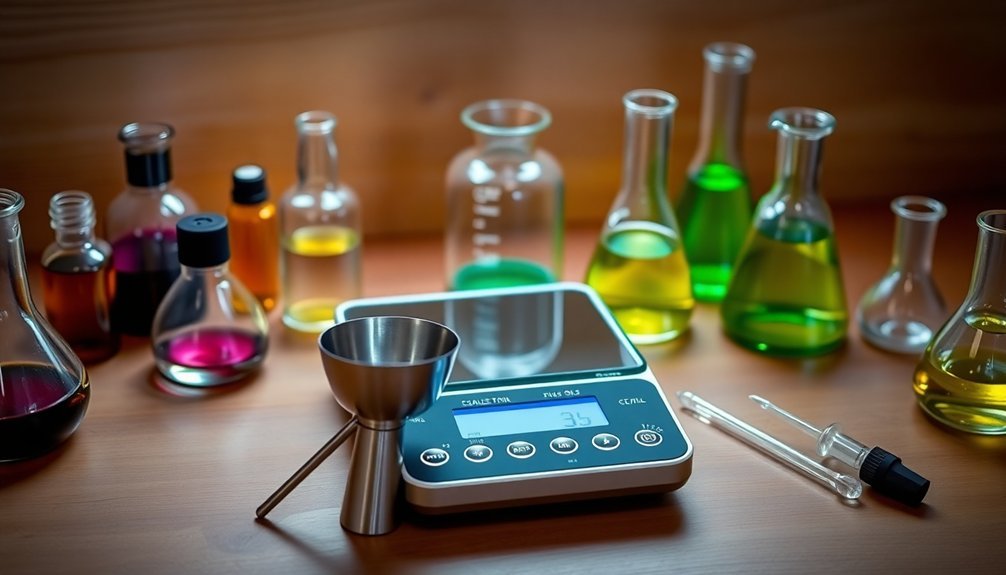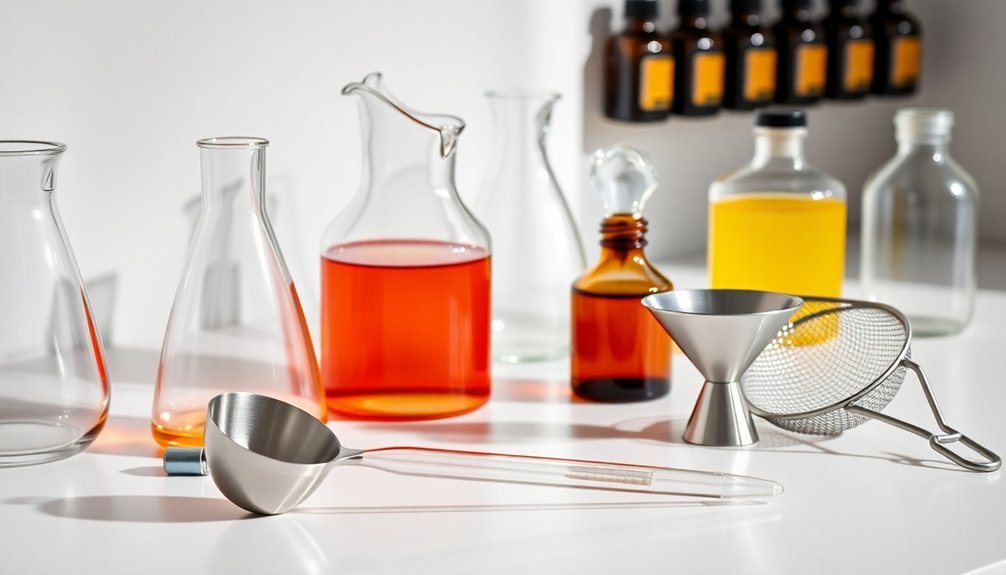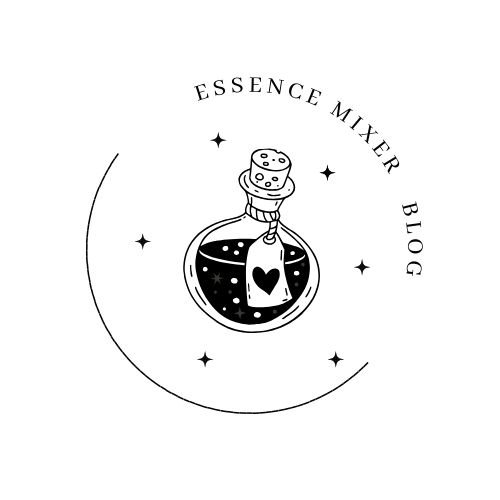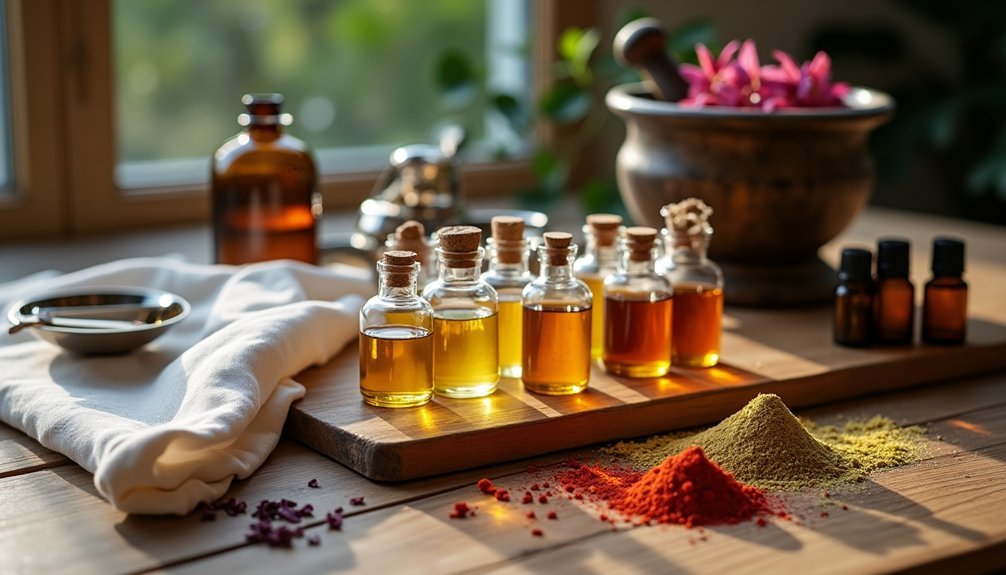To create your own perfumes at home, you'll need five essential tools to get started. A precise digital scale (accurate to 0.01g) guarantees perfect measurements, while high-quality glass bottles with droppers protect your fragrances. You'll also want proper mixing instruments like glass stirring rods and beakers. Don't forget safety gear including gloves and protective eyewear. Finally, invest in filtration tools such as funnels and filter papers. These fundamentals will set the foundation for your perfume-making journey.
Digital Scales and Measuring Equipment

Two essential tools form the foundation of DIY perfume making: digital scales and measuring equipment.
You'll need a digital scale that measures up to 100 grams with 0.01-gram accuracy, or up to 2.2 pounds for larger batches. Using a protective hinged cover helps ensure durability and longevity of your scale investment. Look for scales with tare functions, unit conversion capabilities, and illuminated displays.
For liquid measurements, you'll want glass measuring cylinders, beakers, and funnels to maintain proper hygiene through sterilization. These tools guarantee you're creating consistent, replicable formulas every time.
When shifting from small batches to larger production, your digital scale becomes even more vital for precise compound weighing.
Don't forget complementary tools like thermometers for temperature-sensitive ingredients and measuring columns for adding tiny amounts of materials.
These tools work together to help you achieve professional-level precision in your perfume creations.
Essential Glass Storage Bottles and Droppers
Glass storage bottles and droppers serve as the backbone of DIY perfume making, protecting your precious fragrances while enabling precise measurements.
You'll want to invest in high-quality glass bottles that prevent chemical reactions and feature dense, compact construction. Choose dark-colored or UV glass bottles to shield your fragrances from harmful light exposure, as clear or amber bottles won't provide adequate protection. Spray nozzles available in gold and silver finishes add both functionality and elegance to your perfume bottles.
Make sure your bottles have airtight caps to prevent oxidation and contamination.
When it comes to droppers and pipettes, you'll need tools that offer precise control for accurate measurements. Select ones that are compatible with your oils and store them properly.
Don't forget to label your bottles with blend names, creation dates, and oil ratios. These tools will help you maintain consistency and quality in your perfume-making journey.
Mixing and Blending Instruments

Beyond storage bottles, you'll need a complete set of mixing and blending instruments to create your signature perfumes.
Glass stirring rods are essential for combining your accords and oils while maintaining purity, as they don't react with fragrance ingredients. Using a precise digital scale will ensure accurate measurements for your formulations. You'll want to keep metal spatulas handy for working with solid materials like waxes and powders.
For thorough mixing of larger batches, a magnetic stirrer with magnet bars guarantees consistent blending without contamination.
Don't forget to include non-reactive stirring sticks and a quality funnel for transferring liquids between containers. These tools will help you maintain precision and cleanliness throughout your perfume-making process.
When selecting your instruments, always opt for lab-quality materials that won't compromise your fragrance formulations.
Safety Gear and Protective Equipment
When working with fragrance oils and chemicals, proper safety equipment is essential to protect yourself from potential hazards.
You'll need protective eyewear, such as safety goggles, to shield your eyes from splashes and vapors. A lab coat or warehouse coat will protect your skin and clothing, while a plastic apron adds an extra barrier of protection.
Don't forget to wear disposable nitrile gloves, which offer better chemical resistance than latex alternatives. You'll also need a mask designed for oil vapor protection to prevent inhaling harmful fumes.
Keep a basic first aid kit nearby, including an eye wash station for emergencies. Before handling any ingredients, make sure you've reviewed the safety data sheets and are working in a well-ventilated area with proper electrical grounding and anti-static materials.
Filtration and Transfer Tools

To create professional-quality perfumes, you'll need reliable filtration and transfer tools that assure a pure, particle-free final product.
Start with a glass funnel and commercial-grade filter papers (Wattman grade one) – don't use coffee filters as they won't provide adequate filtration. You'll also want stainless steel strainers for filtering tinctures.
For transferring ingredients, invest in glass pipettes rather than disposable plastic ones, as they're reusable and environmentally friendly.
Complete your setup with borosilicate beakers and glass measuring cylinders for precise liquid transfers. An offset spatula will help you handle materials during processes like enfleurage.
Remember to keep your funnel upright with a proper filtering device to guarantee efficient and steady filtration of your perfume concentrates.
Frequently Asked Questions
How Long Can Fragrance Ingredients Remain Fresh in Proper Storage Containers?
You'll find your fragrance ingredients can stay fresh for 3-5 years when properly stored, but natural oils may last only 1-2 years. Higher-concentration ingredients like absolutes and synthetic components can remain stable longer.
Which Tools Need Regular Calibration to Maintain Accuracy Over Time?
You'll need to regularly calibrate your digital scales, thermometers, and pipettes to maintain accuracy. Don't forget to check your measuring cylinders and beakers occasionally, though they require less frequent calibration.
Can Household Alternatives Replace Specialized Perfumery Equipment for Beginners?
While you can start with household items, they lack the precision and safety features of specialized equipment. You'll need proper measuring tools and storage containers for consistent, safe results in perfume making.
What Materials Should Be Avoided When Handling Essential Oils?
You should avoid using plastic containers, latex gloves, and synthetic fabrics when handling essential oils. Don't use aluminum or metal containers either, as essential oils can react with these materials and become contaminated.
How Often Should Perfume-Making Tools Be Cleaned and Sanitized?
You'll need to clean and sanitize your perfume-making tools after each use. Daily cleaning is essential when working with multiple fragrances. Don't skip sanitizing, as it prevents cross-contamination and maintains quality.
In Summary
You'll find that having these five essential tools will transform your perfume-making journey from amateur to professional. With precise measurements, proper storage, effective blending, safe handling, and clean filtration, you're well-equipped to create signature scents. Don't skimp on quality when building your DIY perfume toolkit – investing in the right equipment now will guarantee better results and a more enjoyable creative process.





Leave a Reply